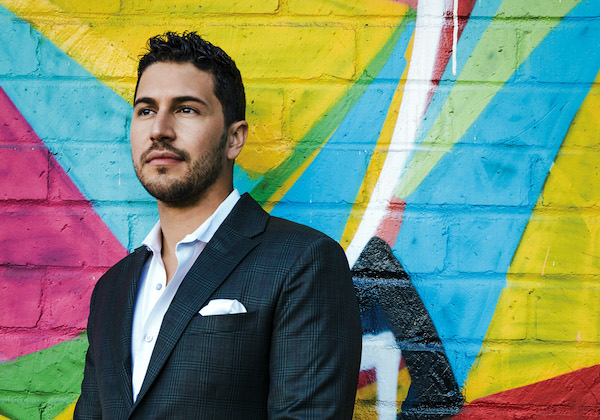Jan 13, 2026 2:09 PM
More Trump-Kennedy Center Cancellations
The fallout from the renaming of the John F. Kennedy Center for the Performing Arts to include President Donald…

Pianist Emmet Cohen’s new album, Future Stride, includes five of his compositions.
(Photo: Taili Song Roth)In the summer of 2020, pianist Emmet Cohen asked himself a key question: “What would Louis or Dizzy do in this situation?”
At the time, much of the world was reeling from the coronavirus pandemic and the economic effects of shutdowns; the absence of in-person concerts only added to the misery.
Facing these crises, globe-hopping jazz ambassadors like Louis Armstrong and Dizzy Gillespie “would have tried to spread some joy and unity and love,” Cohen recently told DownBeat, to provide “something that the world is lacking—not only jazz, but joy.”
So, in October, with the help of his booking agency, Cohen managed to revive a European tour originally scheduled for May and string together a dozen dates over 16 days, visiting Italy, Germany, Switzerland and Austria. His trio-mates for the tour were drummer Kyle Poole and bassist Yasushi Nakamura (subbing for Cohen’s regular bassist, Russell Hall).
Cohen recalled that during the flight to Italy, “there was nobody on the plane; we each had a row to ourselves.” The tour posed several risks and challenges: “The strategy was to drive everywhere or take trains; we didn’t fly anywhere within Europe. ... [The fans] were hungry for live music and super-appreciative. Everywhere we played they said we were the only American band that had come over and performed.”
Spreading joy is what Cohen’s trio has been doing with “Live From Emmet’s Place,” a weekly livestream. It’s also what the 30-year-old recipient of the 2019 Cole Porter Fellowship in Jazz sets out to do on his first album for Mack Avenue, a trio-centered endeavor titled Future Stride. Tenor saxophonist Melissa Aldana and trumpeter Marquis Hill contribute to a few tracks on the recording, including Cohen’s compelling ballad “Reflections At Dusk.”
The weekly webcast has become a hit, with each episode attracting as many as 1,000 live viewers. Dozens of clips are archived on YouTube, with the trio being joined by guests like vocalists Cyrille Aimée and Veronica Swift, vibraphonist Warren Wolf, guitarist Mark Whitfield and saxophonist Tivon Pennicott.
Cohen’s production values are high, and he frequently tweaks the audio and camera techniques to overcome the obstacles associated with broadcasting a band performance from a Harlem apartment. One tip he offers: “Never stream over WiFi—always through an Ethernet cable. It makes all the difference.”
Cohen’s new album, like the trio itself, blends a variety of styles from the past, mixing originals with vintage tunes that recall the stride piano masters of the 1920s, but all played with a modernist sensibility.
“Most people think of stride as an old or ancient thing, an antiquated style of music,” he said, “but I’m trying to incorporate this style of piano playing, for no reason other than I love Fats Waller, Willie ‘The Lion’ Smith, Earl ‘Fatha’ Hines, James P. Johnson and Art Tatum, among others. From a jazz pianist’s perspective, stride is one of the most challenging and exciting genres. Monk learned to play stride from Mary Lou Williams. If I love Monk, I realized that stride must be part of my journey, too. ... I came to understand that all art is modern: That’s what makes it art.”
Cohen has found kindred spirits in Hall and Poole. On the webcasts, the trio swings deeply, often delivering hairpin turns, starts and stops that might lead one to think they are playing well-rehearsed charts. But, in reality, as Poole explained, the musicians’ seeming telepathy is a result of living and working together for five years—and, more recently, quarantining together.
“It’s not that we can read each other’s minds,” the drummer said, “but we give each other little cues. We listen to a lot of music together. So, we have the same musical sensibilities. It’s unique to be in a band where the three of us are so close. In other bands, I haven’t felt that kind of true camaraderie and brotherhood. It’s metaphysical, at this point.” DB
This story originally was published in the February 2021 issue of DownBeat. Subscribe here.

Belá Fleck during an interview with Fredrika Whitfield on CNN.
Jan 13, 2026 2:09 PM
The fallout from the renaming of the John F. Kennedy Center for the Performing Arts to include President Donald…

Peplowski first came to prominence in legacy swing bands, including the final iteration of the Benny Goodman Orchestra, before beginning a solo career in the late 1980s.
Feb 3, 2026 12:10 AM
Ken Peplowski, a clarinetist and tenor saxophonist who straddled the worlds of traditional and modern jazz, died Feb. 2…

The success of Oregon’s first album, 1971’s Music Of Another Present Era, allowed Towner to establish a solo career.
Jan 19, 2026 5:02 PM
Ralph Towner, a guitarist and composer who blended multiple genres, including jazz — and throughout them all remained…

Rico’s Anti-Microbial Instrument Swab
Jan 19, 2026 2:48 PM
With this year’s NAMM Show right around the corner, we can look forward to plenty of new and innovative instruments…

Richie Beirach was particularly renowned for his approach to chromatic harmony, which he used to improvise reharmonizations of originals and standards.
Jan 27, 2026 11:19 AM
Richie Beirach, a pianist and composer who channeled a knowledge of modern classical music into his jazz practice,…